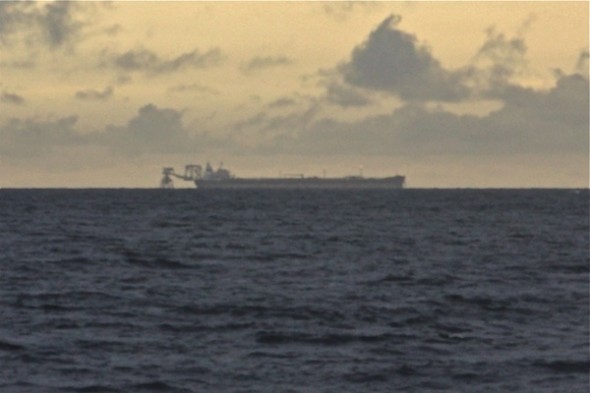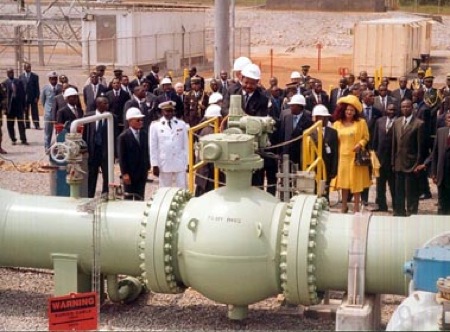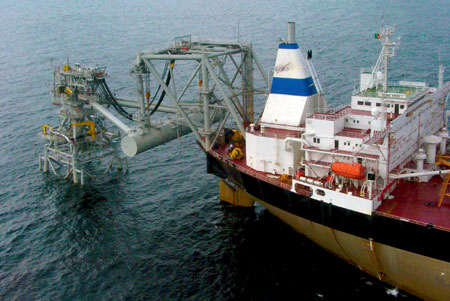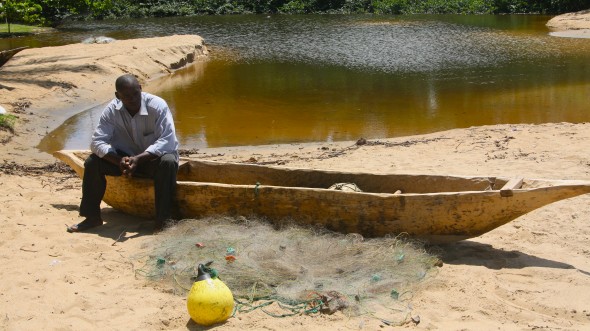Cameroon hires company for oil spill clean-up, nine years behind schedule
You learn all kinds of crazy things reading the news. Cameroon Online published a story from APA news on August 19th, Une firme francaise va faire de la depollution maritime au Cameroun.
According to the story, Cameroon’s Societe Nationale des Hydrocarbures (SNH, the state oil company) has signed an agreement with French company, Le Floch Dépollution, for maritime oil spill clean-up operations.
Better late than never.
Will the Chinese use the Chad-Cameroon pipeline?
I just stumbled across an interesting bit of news. China and ExxonMobil may do business together in Chad. I said, “may,” not “will,” but this could be a significant development.
It is fascinating the way information about the Chad-Cameroon pipeline is revealed. It’s really difficult to get interviews with government or oil company officials. I’ve tried off and on for months, to no avail. So for some information I watch what comes through the (state-run) press. Nothing is straightforward. Items often appear about events that occurred months earlier, for seemingly no reason, but sometimes interesting little nuggets of information are mentioned in passing.
If you’re not paying attention, they are easily overlooked. For example, a few days ago, the Cameroon Tribune (government publication) ran an article about the pipeline with the headline, “36.75 million barrels of oil and 7.6 billion Francs” (That’s about US$ 17 million.)
The article, basically highlights from the October 2010 Pipeline Steering and Monitoring Committee report, began with details on the quantity of oil that had transited across Cameroon during the first ten months of 2010, along with information on the transit fees. Apparently less oil was pumped in 2010 than in 2009. Okay. Chances are if you weren’t following the pipeline story you wouldn’t even read beyond the headline.
Yet, several paragraphs down, the article contained some intriguing information.
Pipeline: Cameroon earns 277.6 million U.S. dollars in seven years
I came across an interesting article that appeared in the Cameroonian daily, Mutations, on December 28th. At a ceremony launching a COTCO-sponsored mosquito net distribution campaign, Guillame Kwelle, the COTCO public and governmental affairs manager, announced that Cameroon had earned nearly US$ 278 million from the pipeline.
Really?
There has been little financial information made available by the Cameroonian government since the pipeline became operational and critics of the project have often pointed to the total lack of transparency regarding Cameroon’s earnings. How much money does the pipeline actually bring in and where does it go? The earnings from the pipeline are part of Cameroon’s petroleum revenues, but there is no data available that would allow people to see what percentage of those revenues comes from the pipeline — as opposed to other oil operations — nor is there any way to know how those revenues are spent. Even if the transit fees are fairly easy to calculate (a fixed, per barrel fee), all the other assorted taxes and fees are harder to estimate. So, this announcement at a COTCO public relations event is newsworthy.
Oil…A Pipeline to Prosperity?
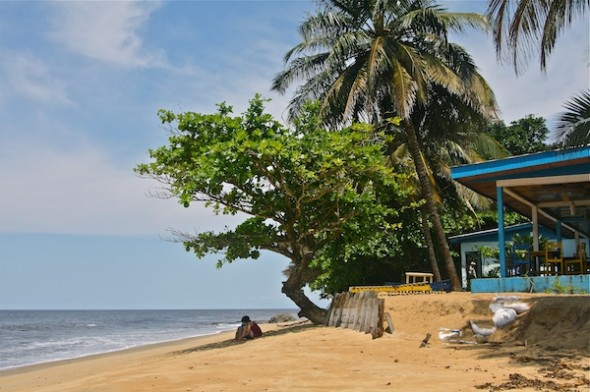
Tourists at Bume Beach, opposite the pipeline's marine loading terminal. Photo by Christiane Badgley
I have produced a short film for PBS/Frontline World to mark the 10th anniversary of World Bank engagement in the Chad-Cameroon Oil Development and Pipeline Project. Cameroon: Pipeline to Prosperity? revisits the story of the “model” oil for development project. Ten years ago the oil companies and the World Bank promised that this project would break the resource curse and prove to the world that oil could be a force for good…
What has happened? Watch the film to see how Chad’s oil has impacted life along the pipeline in Cameroon.
This work was produced with support from Frontline World, The Pulitzer Center on Crisis Reporting and The Center for Investigative Reporting.
Cameroon: Pipeline to Prosperity? is the first installment in my ongoing exploration of Africa’s booming oil industry, Pipe(line) Dreams. You can read more about the project on the website.
Please support my work on this project by viewing the film and leaving your feedback. It is crucial to show funders that this work matters!
The U.S. now imports more oil from Africa than from the Middle East, with oil accounting for more than 80% of all African imports into the country. African is soon expected to account for close to one quarter of U.S. oil consumption.
With Africa increasingly seen as the next frontier of oil exploration, there is no shortage of oil companies lining up for financing from the World Bank Group. Oil drilling has begun in Ghana with support from the World Bank Group; loans may soon be approved for Uganda. New oil has been found in Chad, Cameroon, Nigeria, Angola — even Sierra Leone. The list goes on, with government and corporate officials in each country promising to make oil work for the people.
But in countries lacking accountability, with weak legal systems and lax or nonexistent environmental regulation and enforcement, is oil really a viable development option? And is there a valid reason that public funds subsidize these projects? Both the U.S. and China depend heavily on African oil, yet we rarely see anything about how that oil dramatically transforms African communities, economies and environments. Pipe(line) Dreams, a timely and globally relevant story, will bring much needed attention to the rapidly expanding oil industry in Africa.
Oil Spill near Kribi, Cameroon
A new oil spill was reported at the marine loading terminal offshore from Kribi at 1:45 am on April 22nd.
According to COTCO, the “minor spill” occurred during a violent storm. The transfer of oil from the loading terminal (FSO) to a waiting tanker was halted due to bad weather. High waves washed some “residual oil” from the deck of the waiting tanker. Again, according to COTCO, less than five barrels total were spilled and the oil was immediately cleaned up.
No oil has been reported on the coast, but fishermen did report seeing a sheen of oil offshore.
Several Cameroonian NGOs have released a statement deploring the lack of communication between COTCO and the local populations as well as the lack of any statement or information from the Cameroonian government. The Comité de Pilotage et de Suivi des Pipelines (CPSP), the Cameroonian authority responsible for the pipeline, has not made any public comments regarding the spill. With no information from the government and no journalists allowed near the marine loading terminal, it is extremely difficult to verify COTCO’s information.
In November 2009 the Cameroonian government adopted a national oil spill response plan. This plan, required by the World Bank, should have been in place before oil began to flow along the pipeline in October 2003. The Cameroonian government has not made the plan public and many civil society activists believe the plan remains non-operational. Samuel Nguiffo, from the Center for the Environment and Development, points to the unfolding disaster in the Gulf of Mexico as a warning: “It is urgent that the government increase its capacity to respond to a disaster and make the oil spill response plan operational.”
In the event of a major spill, several million barrels of oil could end up in the Atlantic ocean 12 km. off the coast of Kribi, Cameroon’s main tourist destination and an important fishing and sea turtle nesting zone. The thought of a spill anywhere is terrifying, but watching what’s going on in the Gulf of Mexico now makes me extremely uneasy about Cameroon. Of course the situation in the Gulf is particular, but one clearly sees that controlling an oil spill, even with the best equipment and ample manpower, is incredibly difficult. Any significant spill at the marine loading terminal in Kribi would likely be an ecological (and economic) disaster of major proportions.
It’s important to remember that the offshore marine loading terminal at Kribi (the FSO), is a single-hulled refurbished tanker. Today all tankers, including those used as FSOs, must be double-hulled — an additional protection against spills.
Crude Awakening, Part two
The World Bank-supported Chad-Cameroon oil pipeline looks a lot different on the ground than it does from offices in Washington, D.C. Is the project a success? Depends who you ask!
One thing is certain: the controversy surrounding the “model” oil development project has hardly died down.
This video looks at ongoing compensation problems around Kribi, Cameroon. The Cameroonian Oil Transportation Company, COTCO (ExxonMobil), is responsible for compensating locals for lost lands and revenues.
Traveling from the fishing village of Bumé where locals have been suffering since pipeline construction crews destroyed their fishing grounds, to the Bagyeli pygmy villages in the rainforest, where the Bank-mandated, “Indigenous Peoples’ Plan”, has been stalled for years, I met one angry resident after another.
Today people are especially frustrated as they feel they have no recourse. The government is unresponsive; COTCO (ExxonMobil) is unresponsive. There’s nowhere for people to go with their complaints. It seems the world has forgotten about the Chad-Cameroon oil pipeline.
Missing Fish
Fishing in Kribi isn’t what it used to be. There are certainly multiple reasons for the decline in fish stock, but everyone here singles out the pipeline as the main culprit. The pipeline cuts right through the middle of the coastal village of Bume, just south of Kribi, on its way to the marine loading terminal 12 kilometers offshore. The residents of Bumé, who depend entirely on fishing, blame the pipeline for killing their livelihood.
There are two types of fishing in the Kribi area and the pipeline impacted each differently. The hardest hit are the small, village fisherman — like the residents of Bumé — who put their nets out just offshore. These fishermen do not have motor power; they paddle their small dugout canoes out to sea and are unable work more than a few kilometers from shore.
They used to catch the fish that lived in the reef just offshore. That reef was blasted away during pipeline construction and the fish have never come back. Using their traditional fishing methods, local fishermen now pull in only a few kilos of fish at a time. Sometimes, they pull in nothing at all.
As I mentioned in an earlier post, the initial pipeline plans did not include the destruction of the reef. As no one from ExxonMobil would speak to me, I could not find out why this, a significant environmental impact, was not not part of any early reviews. The shallow waters of the coast here are lined with rocky offshore reefs and the Bumé reef was clearly visible. If any local fishermen had been interviewed, they would have talked about the importance of the reef for local fishing.
Langue de bois
I’ve been in Cameroon for a week now, and there’s lots to talk about. I have to begin, though, with my efforts to get anyone connected with the pipeline project to speak to me. As I’ve been spending many hours in waiting rooms, I felt that this photo kind of summed up a good part of my week.
“Langue de bois” is a French expression: literally, a wooden tongue. Cliches. Hackneyed phrases. Spin. Waffle. What politicians and business leaders do when they want to talk without saying anything, avoid answering difficult questions, steer our attention away from unpleasant subjects, etc.
“As you can imagine, ExxonMobil receives many worthwhile requests from news organizations for interviews. Unfortunately, it is impossible to respond affirmatively to all these requests. Due to timing and other business constraints, representatives of Esso Chad will not be available to participate in the opportunity you present. However, for information, I’ve enclosed a case study of the project, as well as a 2008 news release that notes the benefits of the project.”

